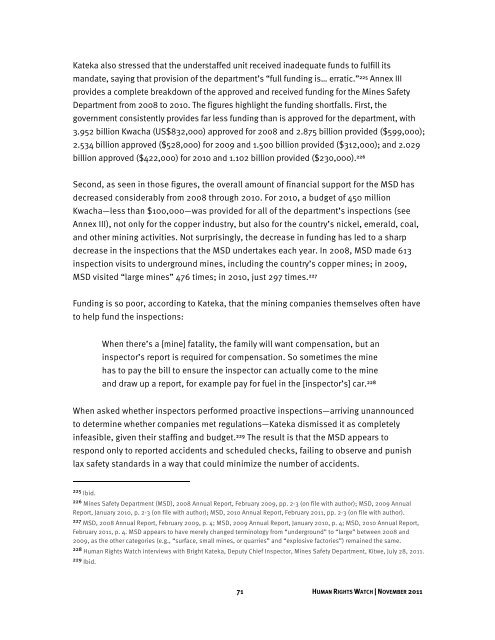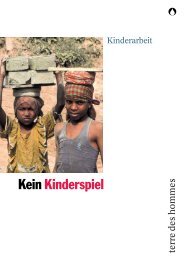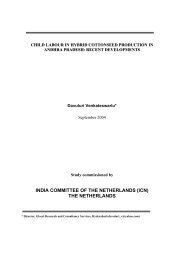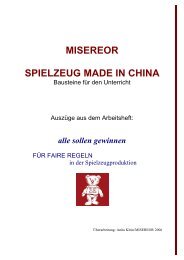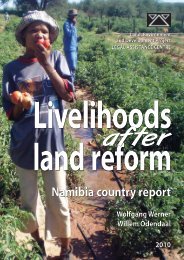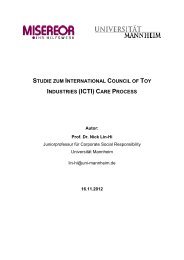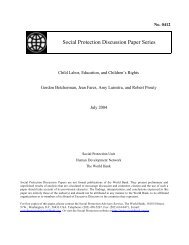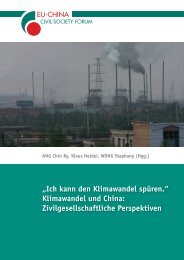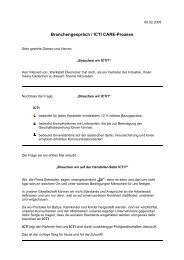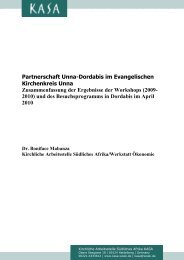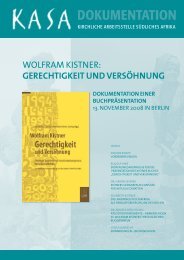“You'll Be Fired if You Refuse†- Human Rights Watch
“You'll Be Fired if You Refuse†- Human Rights Watch
“You'll Be Fired if You Refuse†- Human Rights Watch
You also want an ePaper? Increase the reach of your titles
YUMPU automatically turns print PDFs into web optimized ePapers that Google loves.
Kateka also stressed that the understaffed unit received inadequate funds to fulfill its<br />
mandate, saying that provision of the department’s “full funding is… erratic.” 225 Annex III<br />
provides a complete breakdown of the approved and received funding for the Mines Safety<br />
Department from 2008 to 2010. The figures highlight the funding shortfalls. First, the<br />
government consistently provides far less funding than is approved for the department, with<br />
3.952 billion Kwacha (US$832,000) approved for 2008 and 2.875 billion provided ($599,000);<br />
2.534 billion approved ($528,000) for 2009 and 1.500 billion provided ($312,000); and 2.029<br />
billion approved ($422,000) for 2010 and 1.102 billion provided ($230,000). 226<br />
Second, as seen in those figures, the overall amount of financial support for the MSD has<br />
decreased considerably from 2008 through 2010. For 2010, a budget of 450 million<br />
Kwacha—less than $100,000—was provided for all of the department’s inspections (see<br />
Annex III), not only for the copper industry, but also for the country’s nickel, emerald, coal,<br />
and other mining activities. Not surprisingly, the decrease in funding has led to a sharp<br />
decrease in the inspections that the MSD undertakes each year. In 2008, MSD made 613<br />
inspection visits to underground mines, including the country’s copper mines; in 2009,<br />
MSD visited “large mines” 476 times; in 2010, just 297 times. 227<br />
Funding is so poor, according to Kateka, that the mining companies themselves often have<br />
to help fund the inspections:<br />
When there’s a [mine] fatality, the family will want compensation, but an<br />
inspector’s report is required for compensation. So sometimes the mine<br />
has to pay the bill to ensure the inspector can actually come to the mine<br />
and draw up a report, for example pay for fuel in the [inspector’s] car. 228<br />
When asked whether inspectors performed proactive inspections—arriving unannounced<br />
to determine whether companies met regulations—Kateka dismissed it as completely<br />
infeasible, given their staffing and budget. 229 The result is that the MSD appears to<br />
respond only to reported accidents and scheduled checks, failing to observe and punish<br />
lax safety standards in a way that could minimize the number of accidents.<br />
225 Ibid.<br />
226 Mines Safety Department (MSD), 2008 Annual Report, February 2009, pp. 2-3 (on file with author); MSD, 2009 Annual<br />
Report, January 2010, p. 2-3 (on file with author); MSD, 2010 Annual Report, February 2011, pp. 2-3 (on file with author).<br />
227 MSD, 2008 Annual Report, February 2009, p. 4; MSD, 2009 Annual Report, January 2010, p. 4; MSD, 2010 Annual Report,<br />
February 2011, p. 4. MSD appears to have merely changed terminology from “underground” to “large” between 2008 and<br />
2009, as the other categories (e.g., “surface, small mines, or quarries” and “explosive factories”) remained the same.<br />
228 <strong>Human</strong> <strong>Rights</strong> <strong>Watch</strong> interviews with Bright Kateka, Deputy Chief Inspector, Mines Safety Department, Kitwe, July 28, 2011.<br />
229 Ibid.<br />
71 HUMAN RIGHTS WATCH | NOVEMBER 2011


